August 2023 Annual Meeting & Grantee Celebration
Dear WRWF members:
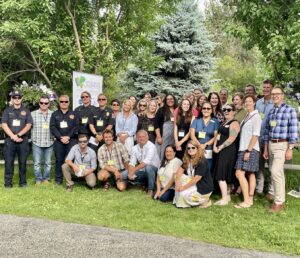
We are thrilled to report that on Aug. 2, 150 members and guests came out to attend our 2023 Annual Meeting & Celebration of Grantees, held in beautiful Elkhorn!
The event unfolded on a blustery afternoon at the home of one of our board members, who generously shared her backyard to accommodate the festivities.
The sound of laughter and aspen leaves rustling in the breeze created a lively atmosphere perfect for mingling and making new connections. Especially fantastic was the strong turnout from our inspiring Grantee representatives. It is our sincere hope that everyone took the opportunity to gather, have a chat with someone new, and celebrate a successful end to the grant season.
Our dynamic WRWF President, Sandy McCullough, kicked off programming with a community update (you can read more about her remarks here in the President’s Message). This was followed by a speech from Grantee Engagement lead Sally Halstead, who recognized each of our 2023 Grantees by name and honored each nonprofit for the role they’ve played in our community. Gail Landis stepped in to share the official voting results, and then we welcomed Sarah Sentilles—acclaimed author, and co-founder of The Alliance—as our keynote speaker.
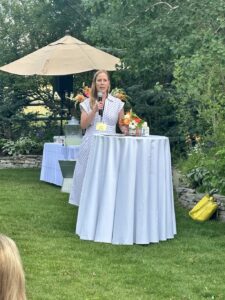
In case you missed Sarah’s thought-provoking talk on empathy, giving, and equity, we’ve compiled a few (abridged) excerpts below:
“Transformational Giving” by Sarah Sentilles
On giving:
“Transformative giving is a kind of giving that doesn’t keep power structures in place, but rather disrupts, and heals, and transforms.”
“Scientists have learned that people who donate kidneys to strangers have different brains than people who don’t. The region in their brains known to produce empathetic responses is larger than average, bigger by 8%. But because they studied donors only after they’d given away their kidneys, how do scientists know that it’s not the giving itself that transforms the brain? Maybe what renders you more sensitive to the suffering of others is having one of your organs in someone else’s body—maybe it’s knowing there’s no such thing as ‘mine.’ What if we were to imagine giving like that, challenging the very boundaries of our bodies and selves?”
“We give to organizations that serve people with needs that aren’t necessarily ours, because they might be someday, and we recognize that to tend to the stranger is to tend ourselves, too.
“You can’t solve homelessness by simply renting an apartment to a person who needs it, but you can solve it by letting the person who is unhoused own the building. Much of the way we imagine giving keeps inequality intact: ‘I have a lot, you have a little, and you still need me, and I get to feel benevolent and you get to feel needy, or bad in some way.’ What would it look like to shift that dynamic?”
On family:
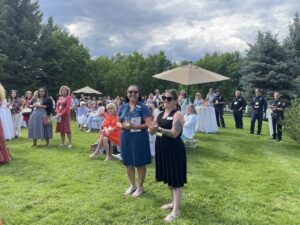
“Any stranger can become family. Before I was an adoptive mother, I was a foster mother to a child that we thought we’d get to adopt but were forced by the state to return to an unsafe situation. This experience of being a foster parent and an adoptive parent has radically shifted what family means to me.”
“Consider this thought experiment with me for a second. What if, when you wanted to grow your family, you didn’t know which child would be yours and you didn’t know how long you’d get to keep them. How would that shift your sense of community—your commitment to prenatal care, to creating excellent public schools, to ending food deserts, to supporting amazing rehabilitation programs, to ending racism? Would you advocate for different policies? If any stranger can become family, then what are our obligations to our community?”
“I’m forty-nine, and I’m a mother to a two-year-old, and you know what’s really humbling? Getting up and down off the floor a million times a day! My son thinks how you get up off the floor and how you walk upstairs is that you grunt while you do that, so he literally grunts because that’s what I do. It’s super embarrassing, but also beautiful.”
On empathy:
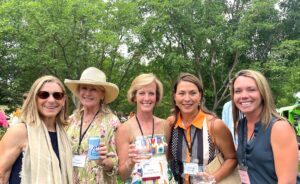
“Laurel Braitman (writer and science historian) argues that sperm whales are the most intelligent. She bases her argument on what she calls whales’ sixth sense. We tend to think of whale echolocation like boat sonar, as if a sound is sent out and it bounces off something in the environment, and then returns, giving us a sense of the shape of the thing. But whale sonar doesn’t only communicate shape; it also communicates feelings and emotions, like grief or joy. Whales might not say ‘I,’ they might always say ‘we’: ‘We sad.’ As evidence of this communal self, Braitman pointed to whales beaching themselves. When 100 whales stranded themselves on the shore and died, scientists studied the bodies of those dead whales and learned that only one or two of the 100 were sick. What looks like extreme empathy to us—maybe it’s a new kind of intelligence that requires not just thinking about the feelings of others, but also feeling the feelings of others. Everything in our world—education, family, social class, addiction, politics, housing and employment—is designed to keep us apart. We aren’t supposed to like each other, much less love each other. But what happens when we give to each other?”
On oppression:
“After I graduated from Yale, most of my identity was about being smart and feeling deserving because I’d worked hard. Then I found myself in a classroom with 36 brilliant first-grade students (in Compton, California). We didn’t have any books or windows; maggots and mice were crawling through our classroom floors. I realized that the whole system was set up to hurt my students and to help me. I didn’t get to go to Yale because I was smart; I was able to go there because I was white, and my dad went there, and my parents had money. This for me was a conversion experience. When you see oppressive systems and understand that the world is set up to help some and harm others, what will you do? Will you pretend you didn’t see it?”
On readiness:
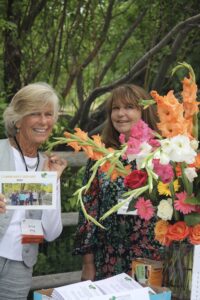
“When I was young and untrained and teaching in Compton, and because I fell madly in love with my students, I did some things teachers should not do—one of which was taking my kids on weekend field trips. One of my students was named Rodney, and I agreed to take him to the movies. Our plan was that I would pick him up at 3 p.m. (on a Saturday). I was home, asleep, on Saturday morning, and my phone rang at 6 in the morning. He said: ‘I’m ready.’”
“I’ve been thinking a lot about prophets. In the biblical text, when prophets are called by God, they say (in Hebrew) ‘Hineni,’ which is translated as ‘Here I am.’ God calls the prophets and before they know what they’re being asked to do—usually something super hard and inconvenient—they say ‘ready.’ What would it look like to be that ready in our giving?”
This annual event always leaves us with such gratitude for our Grantees, who so often remind us why we joined WRWF in the first place. A hearty thanks also goes out to every member who worked behind the scenes to make our Annual Meeting such a success.
Contact Us
Get Involved
Resources
News Briefs
DONATE TODAY
@2024 Wood River Women’s Foundation
Tax-Exempt 501(c)(3) Federal Tax ID #81-4000190
Website By: Studio 360 Design